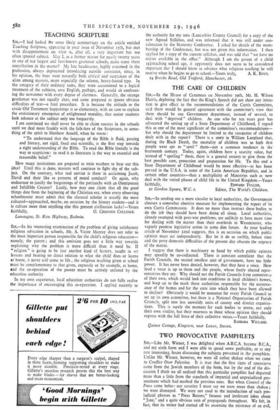SIR,—In sending out a mere circular to local authorities, the
Government chooses a somewhat abortive measure for implementing the report of its own Curtis Commission. It does no more than instruct these bodies to do the job they should have been doing all along. Local authorities, already swamped with post-war problems, are unlikely to have more time for dealing with the matter than their overlords in Westminster, who vaguely promise legislative action in some dim future. As your leading article of November 22nd suggests, this is an occasion on which public opinion must act independently. But let it do so swiftly, before time and the petty domestic difficulties of the present day obscure the urgency of the matter.
I suggest that there is machinery to hand by which public opinion may speedily be co-ordinated. There is constant complaint that the Parish Councils, the second smallest unit of government, have too little power. It has never been denied, however, that they have a voice. How loud a voice is up to them and the people, whose freely elected repre- sentatives they are. Why should not the Parish Councils form committees of their own, which would look into conditions in local children's homes, and keep up to the mark those authorities responsible for the mainten- ance of the homes and for the state into which they have been allowed to decline? Obviously it would be nonsense for every Parish Council to set up its own committee, but there is a National Organisation of Parish Councils, split into less unwieldy units of county and district organisa- tions. This is surely the moment for such bodies to prove, not only their own vitality, but their nearness to those whose opinion they should express with the full force of their collective voices.—Yours faithfully, Quince Cottage, Kingston, near Lewes, Sussex.
BARBARA WILLARD.


































 Previous page
Previous page